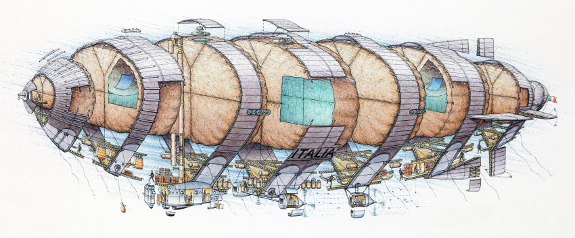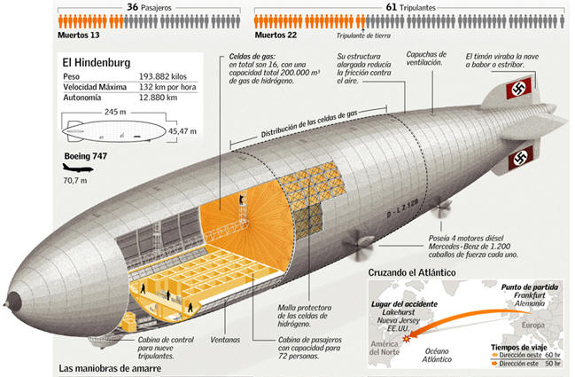
archives for 01/2017
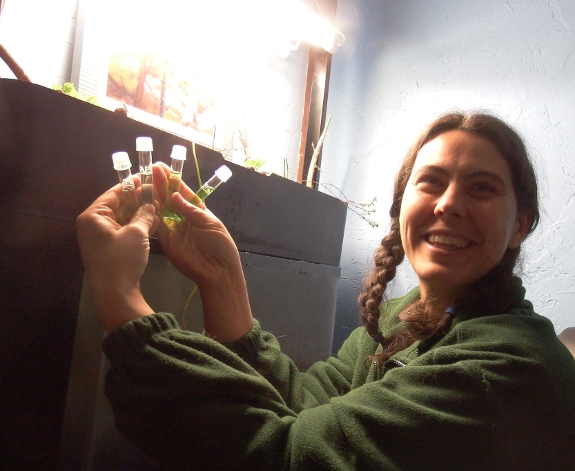
Even though we
started with a kit,
no aquaponics system is truly plug and play. Instead, you have to build
up handy bacteria to change fish waste (ammonia) into the form of
nitrogen plants can use (nitrate). While you can do this by putting some fish
in your tank and hoping the bacteria will grow faster than their poop
will build up, most folks cycle the tank using chemistry instead.
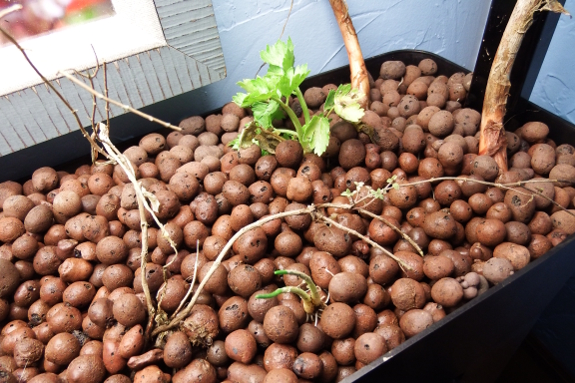
Cycling is pretty
simple. Basically, you set up both your tank and grow bed (with pump
running), then you add a source of ammonia to bring the content of the
water up to 4 to 6 ppm. After that, it's just a waiting game while the
bacteria accumulate and do their job.
So where do you get
ammonia? Supposedly, you can buy it in the cleaning section of some
stores...but it's hard to find straight stuff without dyes, perfumes,
and soaps. I went for the cheaper approach --- aged pee.
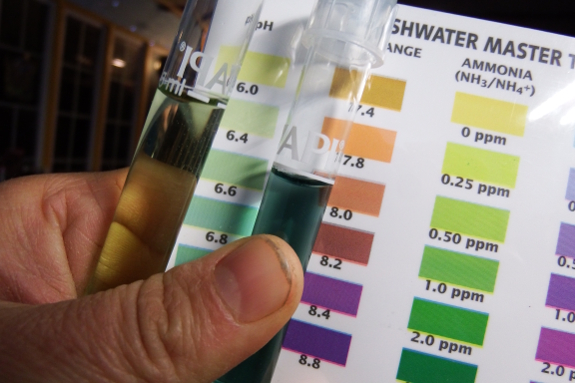
(This picture actually
portrays a pH test. But let's pretend, shall we?)
Half a cup of aged pee
in a ten-gallon aquarium actually overshot the mark a bit, hitting 8
ppm. I could have changed out a bit of the water to bring the aquarium
back into balance, but I also had another ace up my sleeve --- a quart
of wild pond water added to the mix.
I figure seeding some
beneficial microorganisms might let me get away with higher ammonia
levels than are really recommended. Hopefully the pond water will also
lower the usual cycling time of three to six weeks too. The sooner I
can add fish, the better!
I recently learned about
Wabi-Sabi.
A Japanese world view centered on acceptance of transience and
imperfection.
This video I made from 2009
might come close to capturing one of those moments.
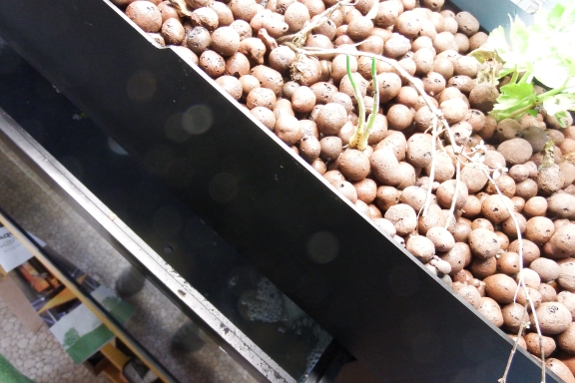
I've been getting a lot
of aquaponics questions both on and offline, so I thought I'd sum the
most common ones up in a single post. Questions have been paraphrased
to save space.
I'm very new to
aquariums, so I was surprised to learn that a 10-gallon tank is actually too small for
even a single goldfish. The aquaponics aspect also mean that you're
better off raising tropical fish, since a heated tank makes the biology
of the waste conversion work better.
To cut a long story
short, we'll probably stock the tank with five guppies once
the setup has cycled.
Or possibly with some of AquaSprouts' other suggested ornamental
combos: 8 neon tetras plus 4-6 dwarf corydoras catfish; 5 tiger barbs
plus 2-4 kuhli loaches; or 5-7 zebra danios plus 2 dojo loaches. Nope,
we won't be eating our teaspoon-sized fish.
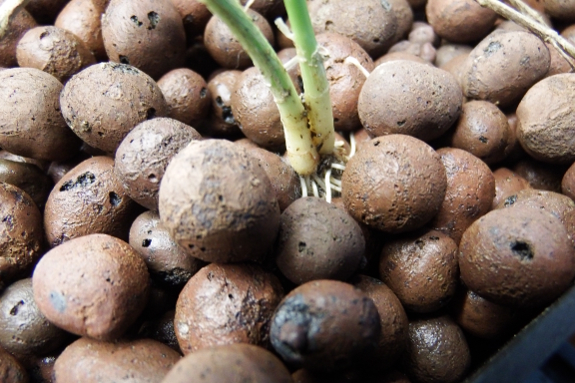
The growing medium in a
hydroponics or aquaponics system needs to be
something inert that holds water between drenchings but doesn't
disintegrate like soil would to fill the water below with gunk. In this
case, we're using expanded clay aggregate --- an extremely
light-weight, rock-like substance formed by baking clay at a high
temperature. You'll soon see some rock wool enter the setup when I
start my basil seeds since seedlings can't handle the large spaces
between the clay pellets.
I consider our tank in
the toy category rather than the tool category. It's 95% for prettiness
and 5% for production of herbs, and I'm well aware I could get the same
production results with less input of electricity by growing the plants
in a pot on a shelf. But it'll be fun and educational to watch the
ecosystem develop, and I figure that's worth a little electricity!
It actually did smell
worse than I'd expected, but the odor disappeared within 24 hours.
Perhaps that's a sign that my ecosystem is starting to work (although
there's still no measurable presence of nitrite in the water). Stay
tuned for more nitty-gritty details as the project progresses!
We added a small strip of flashing to block some light and reflect the rest back.
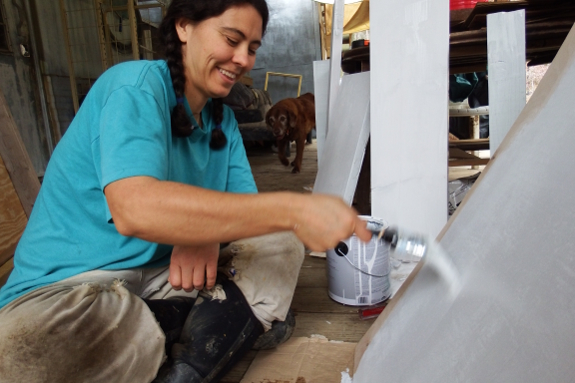
The trouble with me
learning about the joys of paint is that now every project takes three
times as long. Gotta lay down some primer and then pretty colors before
Mark can start putting it all together.
I'm attempting to keep
the obsession in check, though. For example, I didn't paint the
underside of the
upcoming sofa loft...although
I really did think about it.
Aimee needs help designing a
steampunk airship. Any takers? (Roland?)
For story reasons too
complicated to get into here, I'd like to have most or all of the
living quarters down in a gondola suspended below the balloon. So more
like the semirigid or nonrigid airships in the diagram above, although
I'm not actually set on it not having a rigid frame.
The Hindenburg had
capacity for 72 passengers and 40 crew members. It was 250 meters long
and 40 meters in diameter and used hydrogen gas to stay afloat.
I'm thinking of using
hydrogen gas in my story too despite (or perhaps because of) the fire 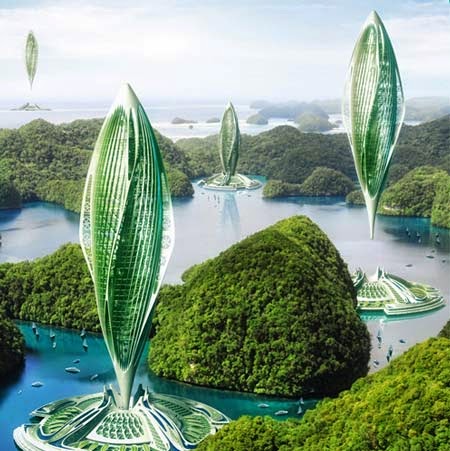 potential. How big do you
think my airship would have to be to need about 8 to 15 crew members
while having capacity for about 15 passengers (hotel-like setting, not
just seats) with an equal-sized cargo space?
potential. How big do you
think my airship would have to be to need about 8 to 15 crew members
while having capacity for about 15 passengers (hotel-like setting, not
just seats) with an equal-sized cargo space?
I'd like to create the
hydrogen in situ using Chlamydomonas
reinhardtii
algae, similar to Vincent
Callebaut's dream,
but built like a ship rather than a city. What kind of lightweight
medium would you grow algae on in an airship setup?
Here are a couple of
other diagrams that floated my boat. (Click on any image to find the
source of the pretty pictures.) Now I'm ready for your ideas --- go!
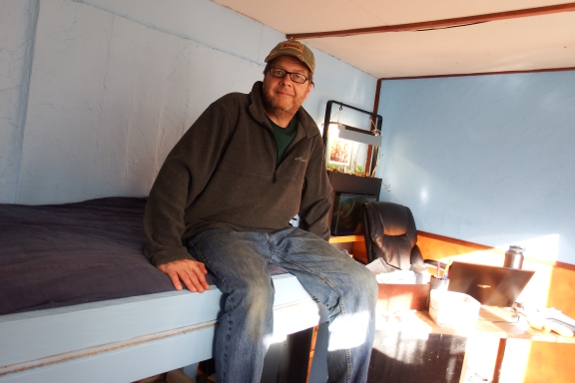
Our elevated
sofa bed is complete! Time for a long, step-by-step post showing
how we did it.
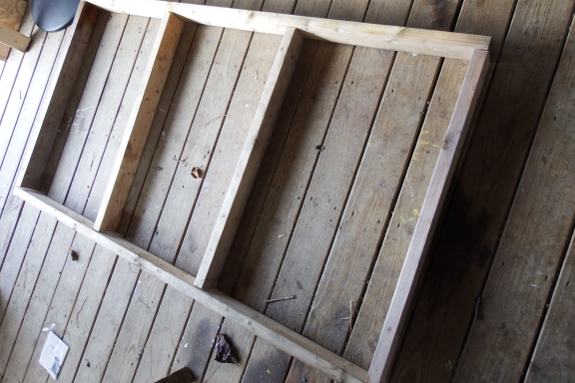
As Mark mentioned earlier, we
began by building the base for the mattress to sit on top of. Since the
sofa may hold multiple people at a time, we wanted it to be sturdy, so
we built a rectangle out of two-by-fours, added two braces in the
middle, and topped it all off with a big sheet of plywood.
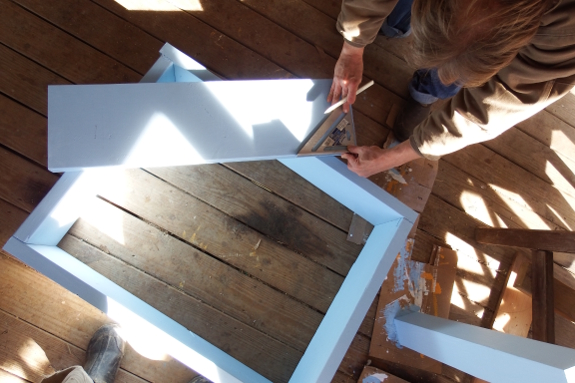
Next came the supports.
One end will be open to the room, so we decided to make a bookcase to
both hold the sofa aloft and increase our storage area.
The other end butts up
against my office area, so we simply cut four-by-fours to act as legs
there.
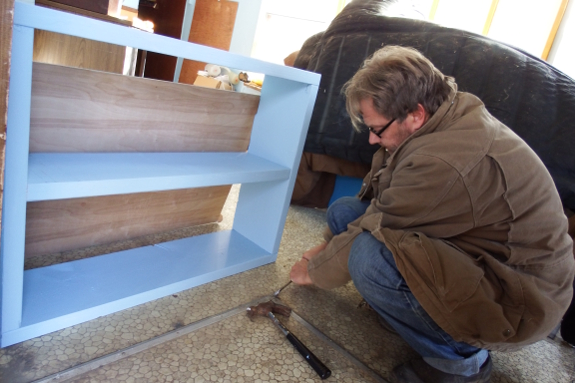
Inside, we pulled the
ancient futon out and started preparing the space. Our trailer came
with carpeting, which we ripped out nearly right away. I never got
around to dealing with the metal rails that held the edges in place,
though, and one strip was going to get in the way. So Mark pried it
loose, nails and all.
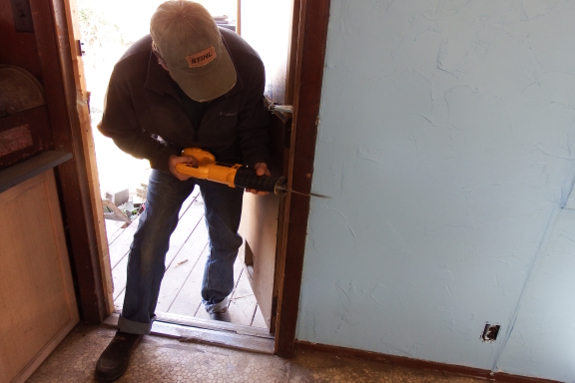
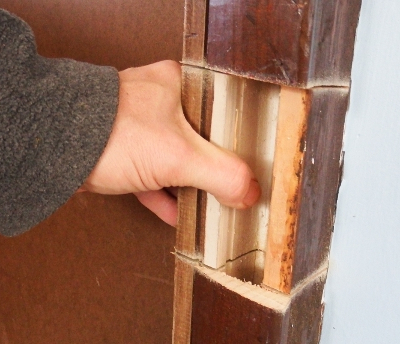 The door frame was also going
to impact sofa placement, so Mark cut a notch with a sawzall. You might
not want to try this at home in a real house. But trailers are so
underbuilt they're easy to manipulate. Turned out that what looked like
a massive hunk of wood was actually a hollow piece that was easy to pry
loose.
The door frame was also going
to impact sofa placement, so Mark cut a notch with a sawzall. You might
not want to try this at home in a real house. But trailers are so
underbuilt they're easy to manipulate. Turned out that what looked like
a massive hunk of wood was actually a hollow piece that was easy to pry
loose.
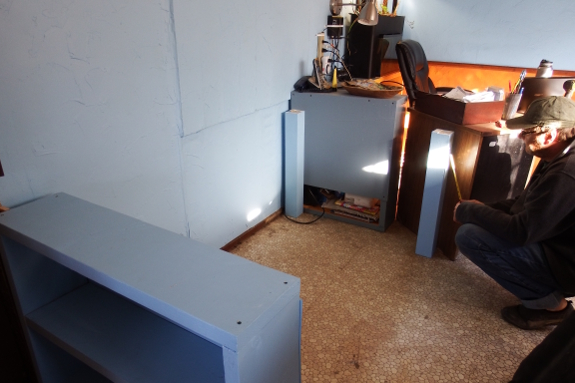
Legs and bookcase in
place and ready for the top....
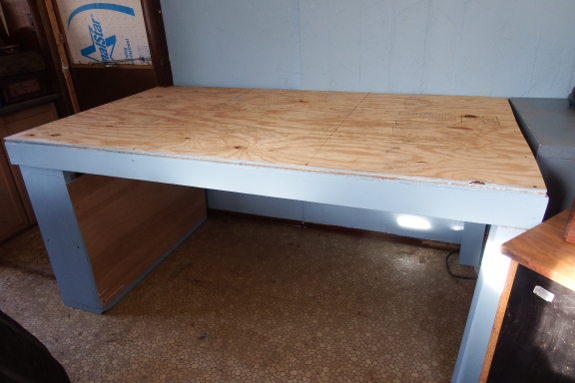
We set the plywood box
on top of the bookcase and legs and tapped it into place.
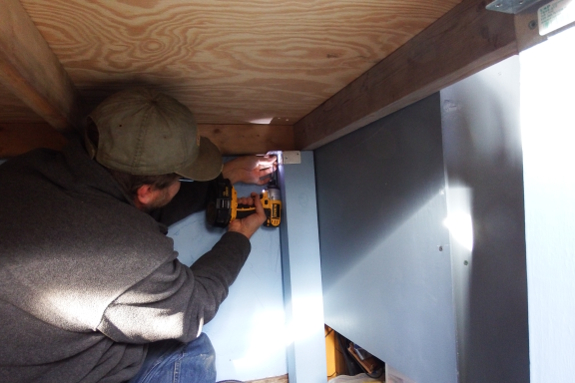
Next, Mark added
brackets to connect the legs to the top...
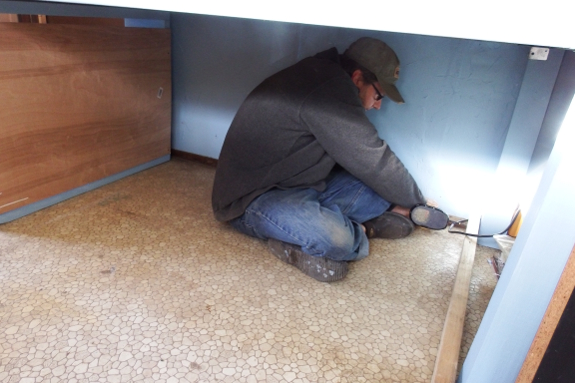
...and a two-by-four at
the bottom to finish bracing the structure.
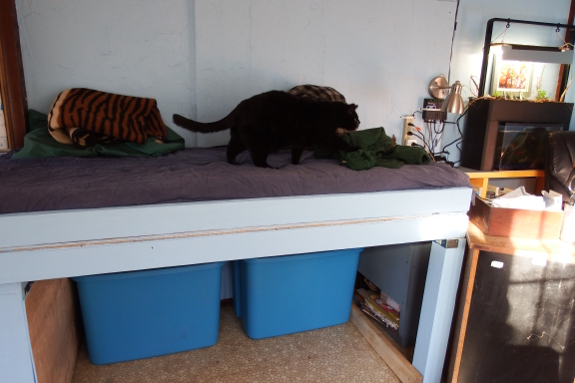
He also added a
two-by-four set on edge on the front of the bed platform to hold the
mattress in place. Add in a memory-foam
mattress (half the cost of the entire project), and Huckleberry was
ready to check the new lounging station out.
It's great fun to sit a
little higher and view the world from a new angle, although we might
have to do something about heat in the summer months. In the meantime,
we're pondering where to put a step to make the top easy to access and
what to do with the storage space underneath. As Mom suspected, it's a
little too low for winter-coat hanging and Mark's not sure about my
idea of turning it into a seed-starting station. We'll see what happens
after we've lived around the new piece of furniture for a few weeks.
My old Muck
boots were 4 years old and starting to leak on creek crossing days.
I upgraded from the chore
boot to the Hi-Cut MuckMaster.
I think the extra height is
worth the extra money and I like the way the MuckMaster hugs the calves
compared to a big gap with the chore boots that would sometimes get
water splashed up and into.
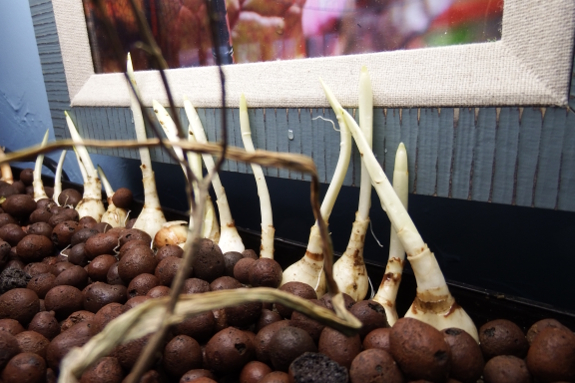
The good news is that
the plants in my
aquaponics setup are
doing well. One celery transplant bit the dust, but everyone else is
either hanging in there or actively growing. I even dug some daffodil
bulbs out of the yard for faster prettiness --- 24 hours after taking
the photo above, their leaves had already turned green and begun to
grow.
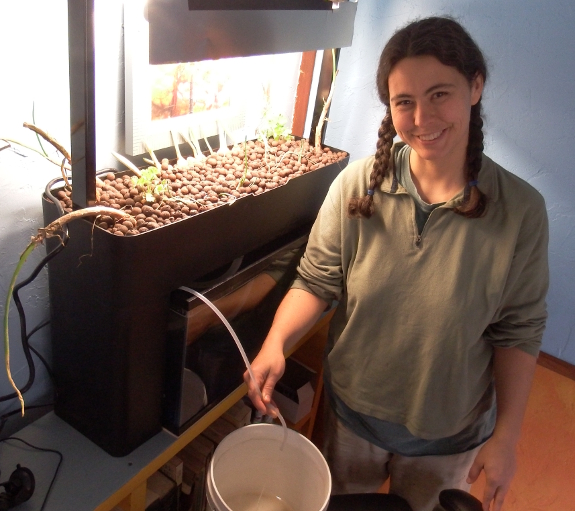
The bad news is that I'm
having a harder time getting the chemistry to even out. Half
a cup of pee was
apparently way too much, and I soon discovered that urine also tends to
dramatically raise the pH of the water as the urea decomposes into
ammonia. So I had to change out about half the tank's water to get down
to an ammonia concentration of 6 ppm and will be slowly adding lemon
juice to bring the pH back on track as well.
All-told, though, I'm
thoroughly enjoying my experiment so far. The hourly pump action is a
handy clock, and the sound of running water soothes me even as it
reminds me to get back to work. All that fun and I haven't even added
fish yet!
The elevated sofa project went so well we decided to make another elevated storage/bed in the bedroom.
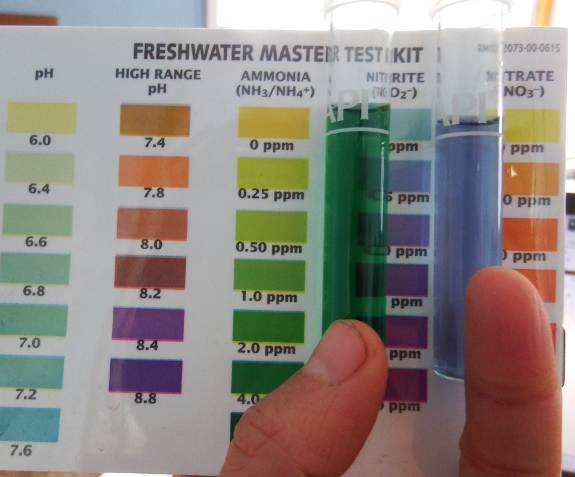
48 hours after my partial
water change, my
aquaponics tank experienced lift off! The nitrite reading had been
stubbornly sitting at 0 since the beginning, but abruptly that light
turquoise changed to a very faint violet. Progress! Looks like those
critters are finally getting to work now that the pH is closer to
proper values. (I actually overshot and went too low this time, but I
think it's going to even itself out...or I'll add a bit of well water
to bring us back up to speed.)
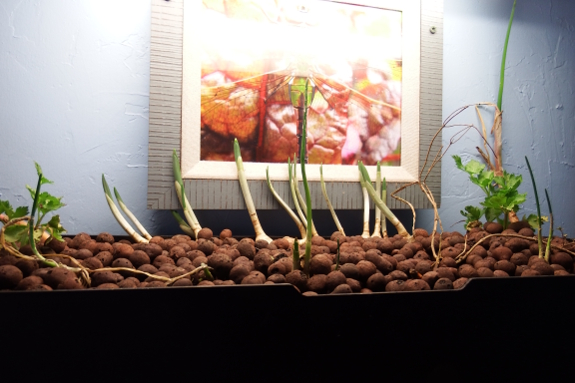
Meanwhile, the grow bed
is really greening up. The chives have grown nearly two inches and I
think the celery might be putting out new leaves. I'm excited to see
how quickly the plants and bacteria work through the nitrogen and how
well the ecosystem stabilizes now that it's gotten its start. Once the
ammonia disappears and then disappears again after I add a second dose,
I'll consider adding fish!
The place we get local lumber
is going to be closing in a couple months.
I'm sad to see them go. They
custom cut our plywood at no extra cost with a smile.
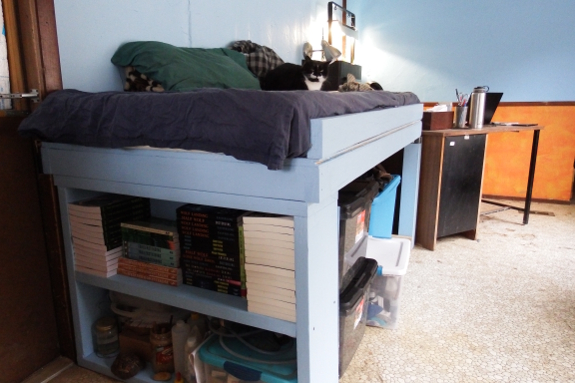
"What's next?" I asked
Mark once the
living room remodel was basically complete. "Hauling in manure for
the spring garden? Cleaning out the composting toilet?"
"None of the above," my
husband replied, and I could see him thinking that he might never get
me into remodeling mode again if he let me stop now. "Next up is your
room."
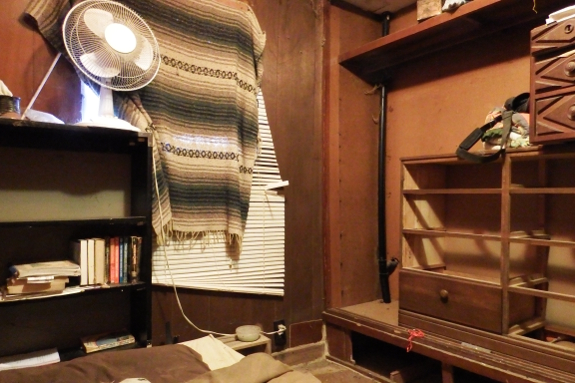
Before anyone gets
concerned about the state of our marriage, I should explain that I'm
the world's lightest sleeper. After battling with insomia for decades,
I finally developed sufficient sleep hygiene so I mostly sleep when and
where I should. But nothing living is allowed to be anywhere near me
when I sleep, and my sleeping room can be used for nothing except
sleeping and changing clothes...which means it looks significantly
worse than my office area did pre-remodel. Sleep hygiene, to me,
doesn't seem to involve actual, well cleaning.
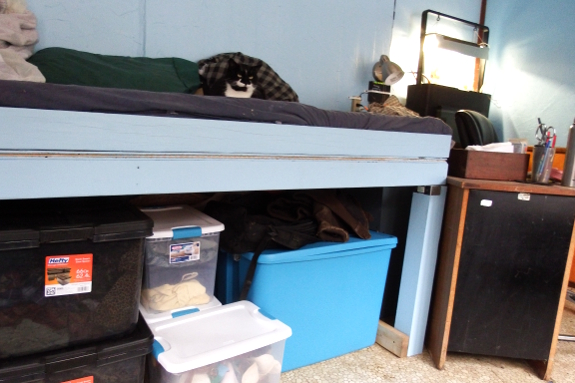
What's the plan? Mark
helped me purge about two-thirds of my accumulated possessions, then I
packed the rest into bins to sit under the sofa during remodel part
two. I've picked out paint, Mark
brought home the lumber, and next week will be time for
rejuvenation of my sleeping space!
Our first Snow Capped Shitake mushrooms came during a recent dusting of snow.
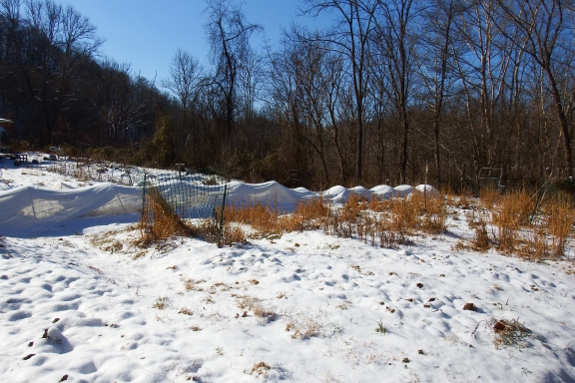
Our first truly cold
spell of the winter hit this weekend, with two inches of fluffy snow
and daytime highs below freezing. Saturday night it dropped to 7
degrees and I was worried about our outside critters.
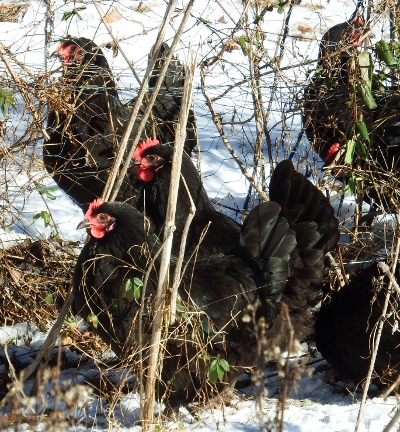 To my surprise, everyone
carried on as usual. In fact, we harvested 10 eggs from our 14-hen
flock --- not bad for girls who've spent the day freezing their toes
outside!
To my surprise, everyone
carried on as usual. In fact, we harvested 10 eggs from our 14-hen
flock --- not bad for girls who've spent the day freezing their toes
outside!
Winter chicken care is
pretty basic, actually. You want your chickens to be dry and draft-free
(both of which are far more important than warm), to have plenty of thawed
drinking water and
food, and to enjoy light
in the coop during part of the night to ensure regular egg
harvests. Do all of that and your hens will ignore the fact they
originated in the tropics and carry through quite well down to 0
degrees and lower.
Now, if I could just train myself not to worry when the mercury
plummets, then we'd be all set....
The Kubota X900 got stuck
today about halfway out to our parking area.
Really thick ice chunks get
wedged in the ruts in the wrong way.
Good thing it's getting
warmer later on in the week.
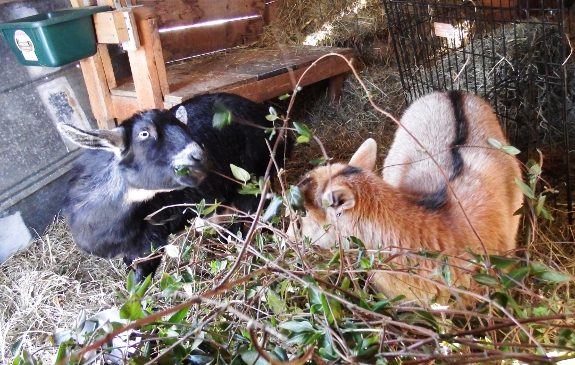
While the weather has
been so cold and snowy, I've been taking the honeysuckle to the goats
rather than the goats to the honeysuckle. They don't get quite as much
nutrition out of armload deliveries, but Artemesia still prefers the
couch-potato approach. After all, she's been eating so much hay to feed
her babies that she's a bit unsteady on her feet on uneven ground and
doesn't feel like reaching up in search of climbing vines.
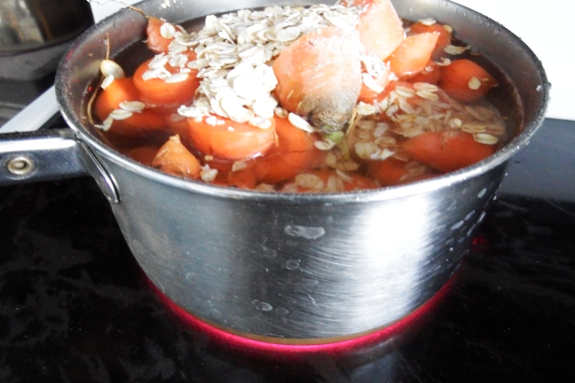
To further spoil my
herd, I decided to cook up their carrots and butternuts on the coldest
morning, adding a handful of rolled oats for extra carbs.
Unfortunately, even after draining the soup, Artemesia still turned up
her spoiled nose and required me to go home for an uncooked version.
Lucy ate the discarded goodies while my pregnant doe happily crunched
away on her usual cold breakfast. So much for hot mash!
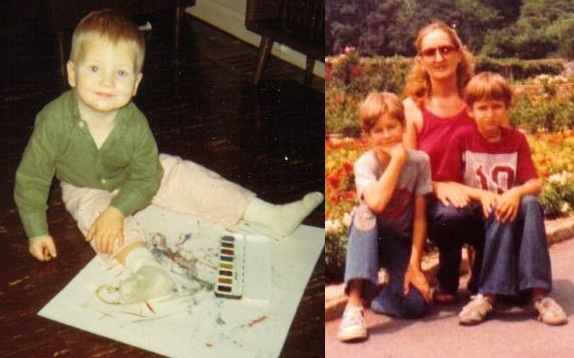
Happy birthday, Mark!
I've only known you during one of the ten factors of your current age,
but I imagine you brought peace and joy to everyone around you during
the others as well. I feel so lucky to spend every day in your presence
and I look forward to saying I've celebrated three of your factor
birthdays with you when you're twice this age.
Now my question for the
reader --- how old is he?
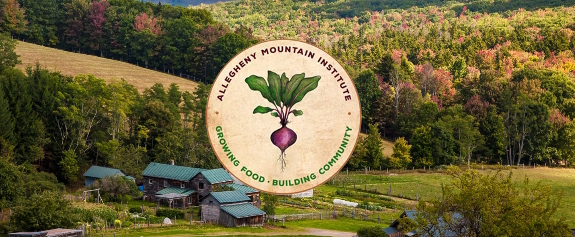
Permaculture Design
Certificates can be very costly to come by, so I thought I'd share this
opportunity for a program that actually pays you to learn. You spend
six months studying on-site with room and board paid for, then you
commit to a year of community service (that comes with a $18,000
stipend) to cement that education. In the end, you walk away with a
(presumably) very deep understanding of the topics plus that
certificate which can help you make a living by teaching or consulting.
Here's the summary of
the syllabus:
- Full season organic gardening
- Rotational grazing
- Small animal husbandry
- Permaculture design
- Soil science
- Conservation
- Mushroom cultivation
- Beekeeping
- Cooking, preserving & fermentation
- Nutrition & wellness
- Community development
- Nonprofit management
- Food access issues
Interested? Check out their
website and work up
your resume fast because applications are due February 1. Good luck!
I end up doing 90% of the
wood splitting with the biggest wedge.
Makes me wonder if an even
bigger wedge would split faster?
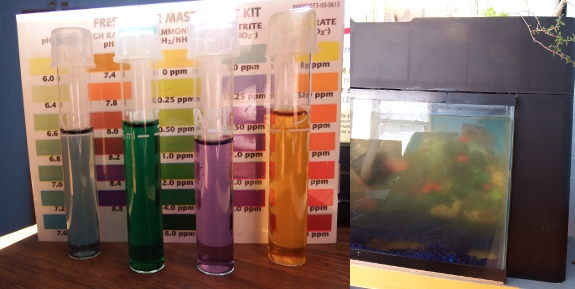
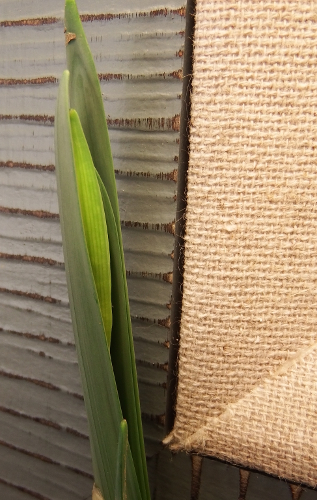 Back when I was first getting
the pH and ammonia levels in my aquaponics tank close to recommended
values, the water went crystal clear. I'm now realizing that sparkling
water is actually a bad sign in aquaponics.
Back when I was first getting
the pH and ammonia levels in my aquaponics tank close to recommended
values, the water went crystal clear. I'm now realizing that sparkling
water is actually a bad sign in aquaponics.
In contrast, as soon as I did a partial
water change and began seeing both nitrites
and now nitrates in the water, turbidity levels rose once again. Those
nitrogen-converting bacteria --- not stirred up sediment --- must be
what's causing the cloudiness. I'm thrilled to be able to see my
microbial partners as they work!
In other news, one of my
forced daffodils is already sending up a bloom bud. Looks like my grow
bed is going to turn pretty sooner rather than later!
A thin sheet of plywood on
two hinges makes a good plywood curtain.
Sometimes a full moon shines
too much light in this window for sleeping.

Joey took these great shots of an
Arthur wall --- a heated wall to train espaliers against for freeze
protection. Since fruit plants need lots of light, you'd probably only
plant them against the south side (or the north side if you lived in
Tasmania where these photos were taken). So what would you put on the
opposite face to utilize all that heat? Perhaps a chicken coop to up
your egg production?
How long was the Kubota X900 stuck
earlier this week?
Just a couple days. The ice
melted enough to crush through the big chunks.
I think we could've busted up
some of the ice with a spud bar to get unstuck but we were on our way
to the dentist for a cleaning and didn't want to be late.
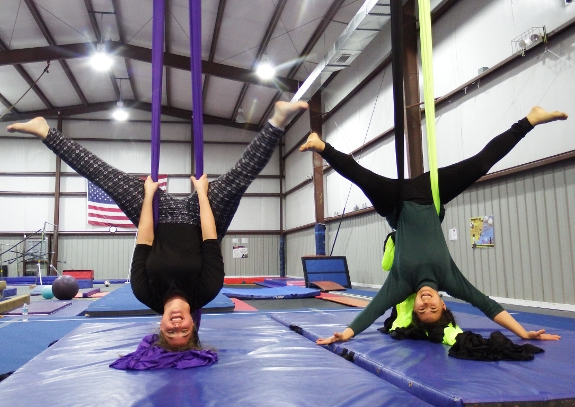
 "Wanna go to circus school
with me?" I asked Kayla one day last week.
"Wanna go to circus school
with me?" I asked Kayla one day last week.
"Um, sure?" responded my
long-suffering friend.
Aerial silks was
surprisingly fun --- the hour flew by and I'd be a regular if the gym
wasn't located an hour from our farm. Here's the link in case anyone else in the
area wants to run away and join the circus.
Kayla: "That was
definitely a once-in-a-life-time experience."
Anna: "Is that the
polite way of saying you aren't going back?"
Our big carrot harvest of 2016 continues to feed us and both Aurora and Artemesia.
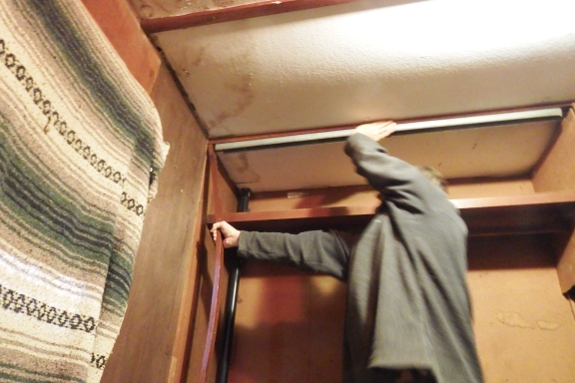
The trickiest post of
remodeling (for me at least) is deciding how much of a perfectionist to
be. For example, in the bedroom there's a lot of water damage in the
ceiling tiles from a leak that came before our time. I'm sure the pros
would have told us to rip the panels out and replace them...but instead
I just laid down a coat of primer and then a coat of paint.
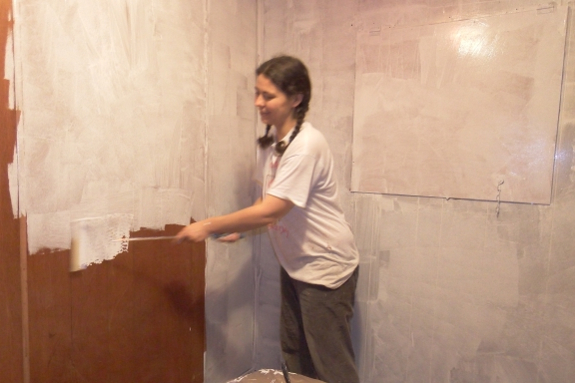
Similarly, I decided not
to deal
with the indented lines of the wood paneling and even avoided
spackling over nail holes. This room will see low use during daylight
hours and will generally be viewed under low light, so less disruption
of my sleep during remodel trumps polished perfection. Plus, it
lets me get to the fun part faster --- painting!
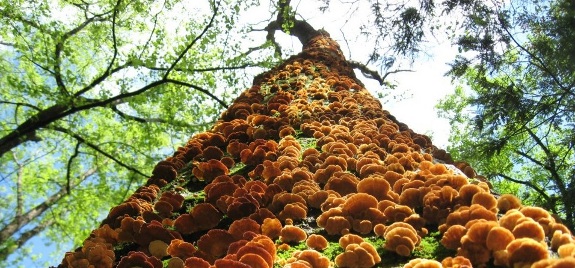
Mushroom Mountain
is now offering online courses that include on demand and live
webinars.
Anna
and I took a class from Tradd Cotter in Asheville and were very
impressed with his teaching style and content.
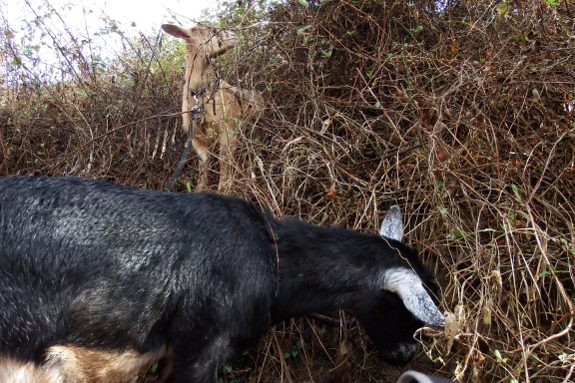
Artemesia has been
putting so much food in her belly lately that she's a bit ungainly on
her feet. Meanwhile, the only good grazing is now on steep hillsides
full of thorny blackberry 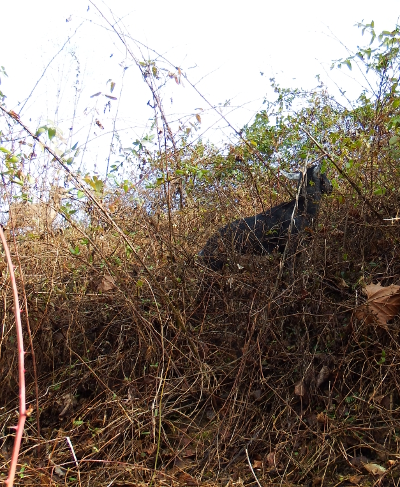 brambles. So while it's been
cold and wet, I've been pulling honeysuckle off the side of the barn
and taking it to my pregnant doe in the coop. (No, of course she's not
spoiled!)
brambles. So while it's been
cold and wet, I've been pulling honeysuckle off the side of the barn
and taking it to my pregnant doe in the coop. (No, of course she's not
spoiled!)
But Saturday was so
beautiful, Artie seemed more willing to go out. She gamely climbed up
onto the rise that separates our trailer from the floodplain and
everything was delightful...until the time came to get her down. Then I
had to beg her and tease her and even pull on the leash a little bit.
But I'm sure the sun still did her good and all that fresh forage will
be much appreciated by her growing kidlets.
Finished up the elevated bed
platform this afternoon.
It went a little faster than
the couch thanks to some improved building skills.
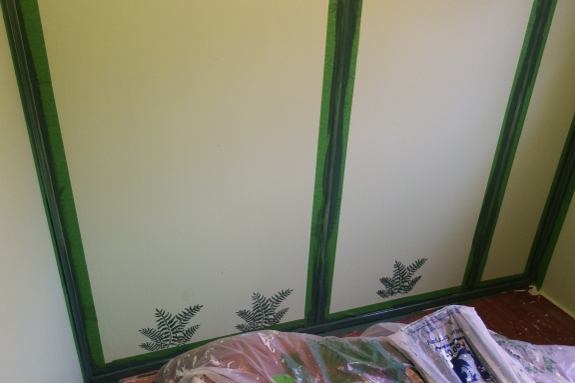
When Mark and I went to
pick up the bedroom paint, there was a new type of painter's tape
beside the traditional blue stuff. "Frog
Tape: Keeps Paint
Out. Keeps Lines Sharp. 10% Bonus Length." the advertising read. Plus,
it was a dollar cheaper than the blue stuff. I bought a roll.
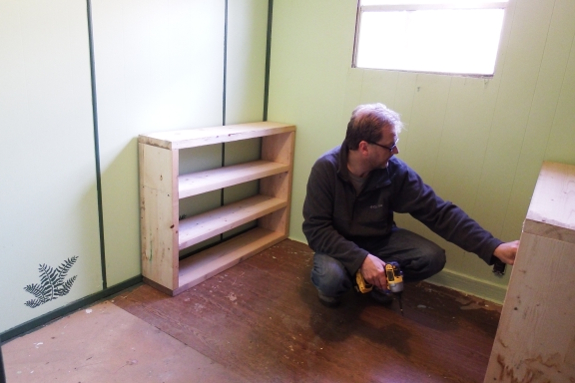
So did the product live
up to its claims? I didn't do a side-by-side comparison, but I'm not
sure I'm sold on the Frog Tape.
I masked off either side
of the raised ridges we'd decided to paint a darker shade of green
about 18 hours after slapping on the final coat of pale paint. But when
the time came to take off the tape...it took off some of the dry paint
behind it as well.
Meanwhile, the crisp
edges didn't really materialize (although they might have been a little
less blurry than what I would have gotten with blue tape). To cut a
long story short, I'll be doing some touch-up work when it's all said
and done. Oh well, it's hard to complain about getting to play with
paint!
Our first touch of color this year showed up in the form of an aquaponic daffodil.
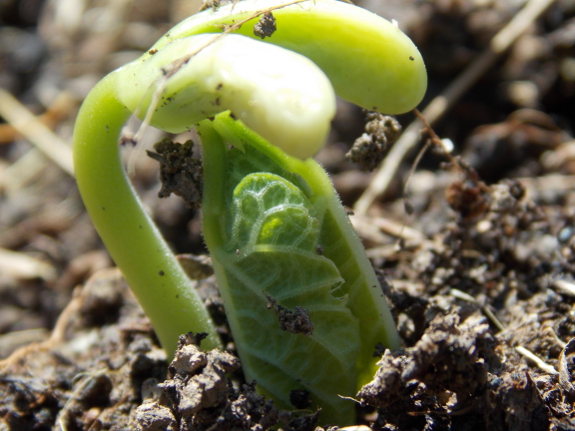
While I was sick this
past summer and fall, I doubted everything about the homestead (well,
everything except Mark and Artemesia). Now that I'm bouncing back, it's
easy to settle into old patterns. But I've decided to be smart instead
and make the necessary changes so I don't go down the same dark road
again.
To that end, my garden
ambitions this year are extreme --- I hope to cut back my work by 50%
while still feeding us most or all of fresh produce we eat.
Spreadsheets to the rescue!
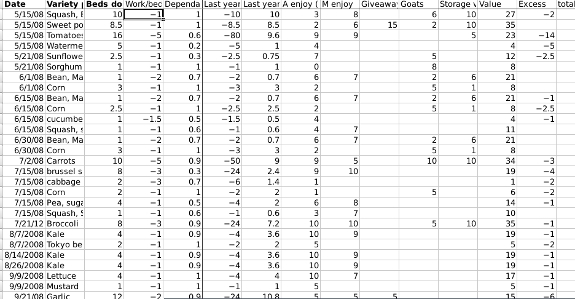
I've
attached my garden-planning file in case anyone wants to use
it as a jumping-off point for your own work-to-joy analysis. For those
terrified by the mere idea of Excel, here's the upshoot:
- We're cutting everything back a small amount so I won't end up giving so much away
- I'm not going to preserve any soup for winter, so I dramatically reduced quantities of soup components
- I generally deleted crops that aren't streamlined to the point
where they produce in proportion to the amount of work I put into the
project
I suspect we'll end up
having to buy a few more goat carrots, onions, and possibly winter
vegetables. But otherwise we should still be eating primarily off the
farm for the entirety of 2017.
Final estimates: garden
square footage will reduce by 43%, yields will reduce by 38%, and
work will reduce by 50%. I hope this means joy will also increase by
100%. Stay tuned for more details as the project progresses.
The new elevated bed needed an elevated shelf for the night time fan.
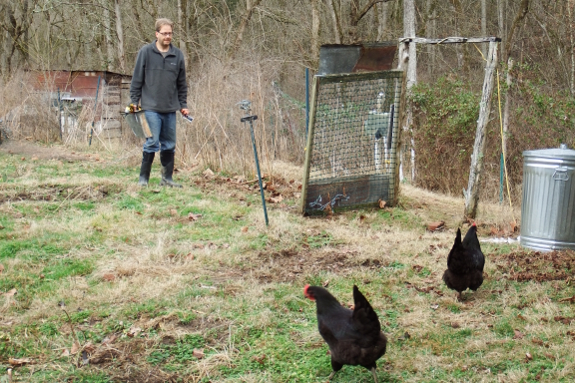
One renegade hen got
into the mule garden last Tuesday. "Whatever. It's winter," I said.
The next day there were
two. Then three, and the mini flock got bold enough to wander to the
front garden on the far side of the trailer.
"Mark!" I called
angstfully.
Long-suffering husband
stood in the garden for half an hour and waited to see what was going
on. Sure enough, renegade number one was flying up onto the top of the
gate and over, followed by her sisters. A piece of tin, one more chase
of pesky fowl out of the yard...and the next day Rogue 1 was back in
the garden. How's she getting in this time?
We made a major goat
discovery today.
Artemesia will eat all her copper
bolus with a little
trickery.
Cut a dried fig in half with
a gram from the copper bolus in both halves.
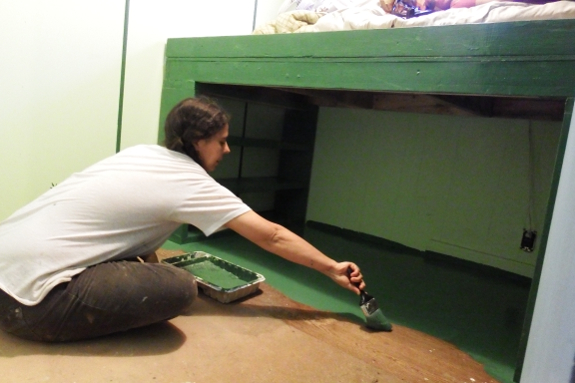
A little more paint and the
bedroom is done. It's tough to take a comprehensive photo of such a
small space (literally about twice the size of a twin bed), so here are
a few shots from each direction as a sort of tour.
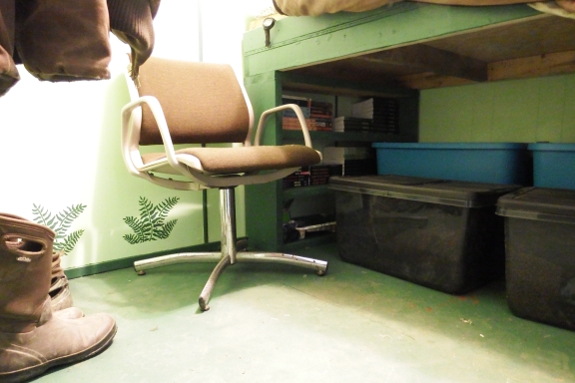
The raised
bed gave me plenty of room for storage. Books by me (multiple
copies of each, so they don't need to be easily accessible) go in the
bookcase support while bins of clothes and ancient journals/sketchbooks
are safe in mouse-proof bins.
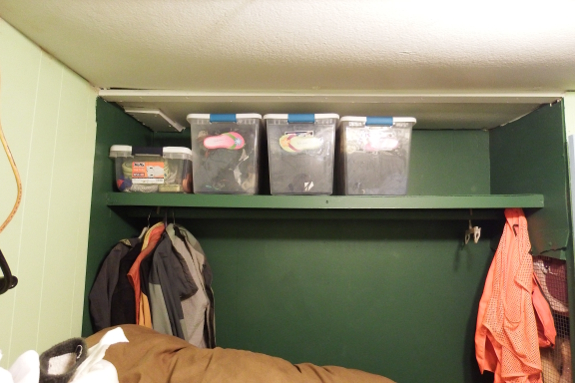
The closet is pretty
empty at the moment, but I'm just thrilled to have finally found the
spot where rodents were entering my sleeping space. Down beneath a
built-in cabinet, we discovered a four-inch hole that Mark has now
filled in with wood and liquid nails. No wonder that corner of the
trailer was mouse central for the last decade!
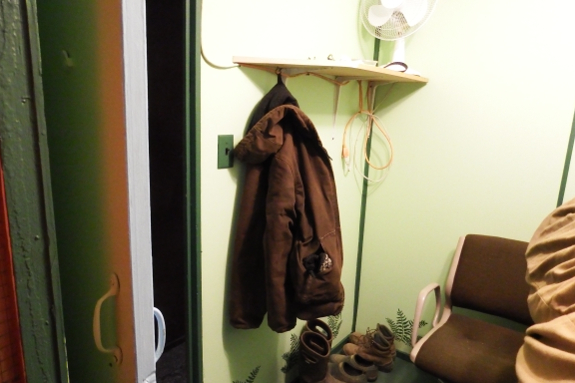
Better yet: my boots and
winter coat finally have a home other than draped-over-that-chair and
tossed-in-that-corner. Here's hoping that cutting down my possessions
to the ones I really use and giving each a place will prevent future
clutter. For now at least, it's a joy to have everything so shipshape.
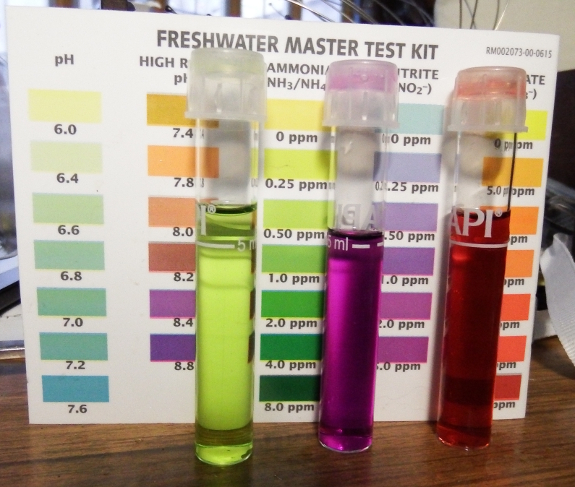
My aquaponics experiment
is a slippery slope. I started out with easy
herbs transplanted out of the garden (plus a few daffodils
for color), and all they needed was the tiniest of fluorescent lights
overhead. But as the ammonia got converted to nitrite and the nitrite
to nitrate, I realize the error of my ways --- herbs aren't hungry
enough to use up all of the nitrogen in my tank.
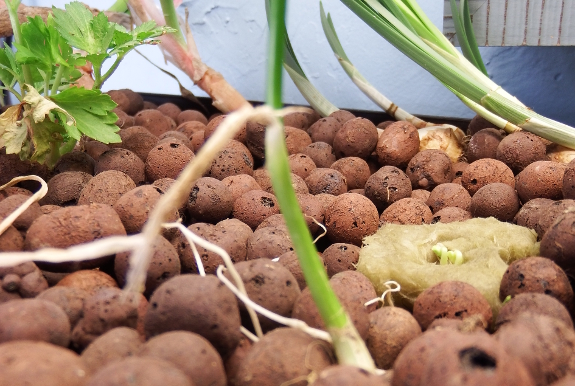
So I've added some
greedier plants, starting these from seed because I don't have any
heavy feeders in the garden at the moment. Cucumbers and summer squash,
plus some basil and parsley to round out my herbs.
But the writing is
already on the wall. These summer beauties will be glad to suck up the
excess nitrogen...but they're gonna need more light. And so the cycle
continues....
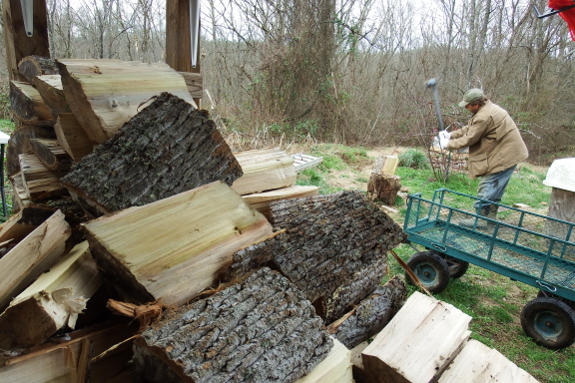
It's been a year since we
moved our firewood station closer to the back door.
I would guess we've saved a
couple hours when you total up the time saved.
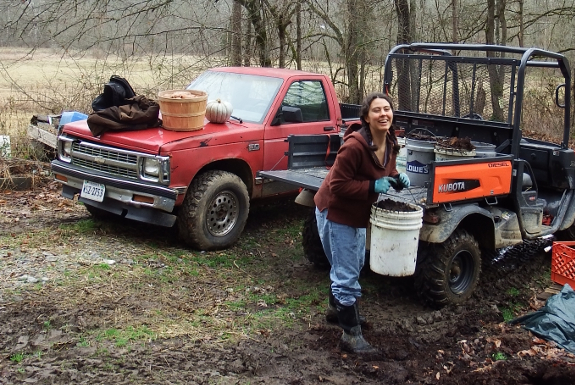
Did I ever mention that
I love manure? Mix in a healthy helping of high horsepower Kubota
action and fertilizing the garden has never been so easy or so fun.
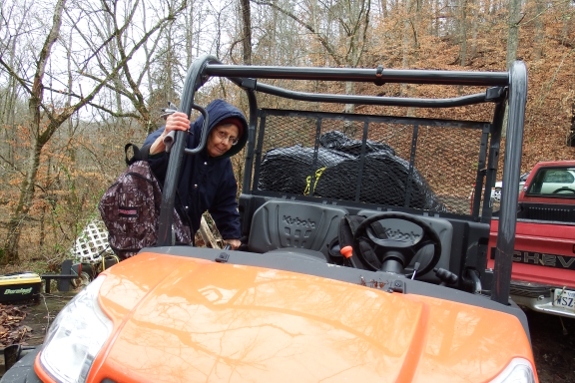
Thanks for coming over and taking pictures, Mom! Your wonderful presence and all those delightful bags of leaves were much appreciated too. Next time, maybe I'll let you drive.
We harvested enough shitake
mushrooms today to last several meals.
Might be our biggest shitake
harvest so far.
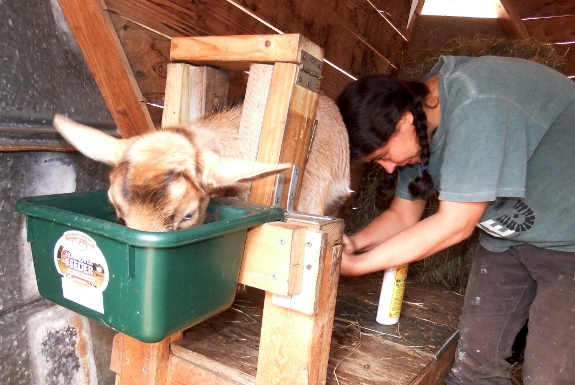
Aurora's feet are now
half again as big as her mother's. Strange since our little girl is
only 1/4 Nubian (and 3/4 Dwarf Nigerian) while her mother is half and
half.
But I think getting as much milk as you can handle for the first seven
months of your life might turbo-charge you forever. In fact, I can see
inklings that Aurora is going to be our new herd queen before too long
as her size begins to outpace her mother's. Here's hoping she keeps
some of Artemesia's sweet temperament despite the transition and
doesn't turn into a bully.
We broke our big splitting
wedge today.
A little chip off the side
makes a big difference in getting the wedge started.
The medium size is almost as
good requiring about 20% more elbow grease.
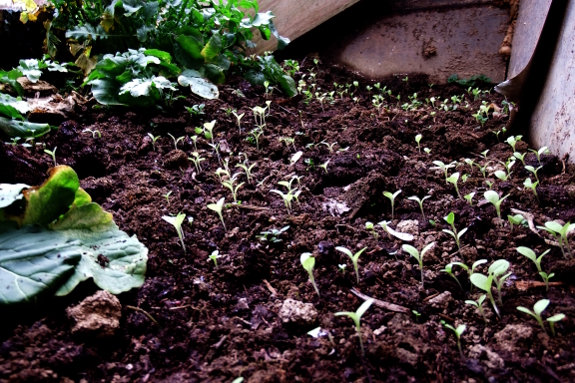
Except for that one cold
spell a couple of weeks ago, this winter has been unbelievably mild.
I've taken the change of speed as a personal favor from the weather
gods and am enjoying every moment of the sunny days.
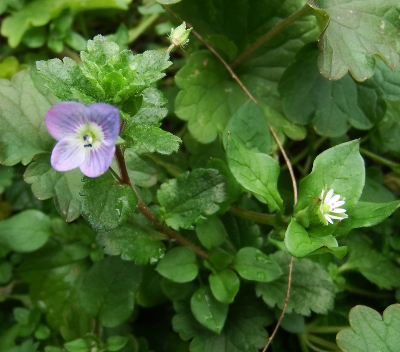 Apparently, the plants and
animals feel the same. I heard a chorus of wood frogs calling in a
sunny spot down the road last week (although they quieted back down a
day later) and the honeybees have been out flying every warm afternoon.
Sunday I figured out why --- the speedwell and chickweed are in full
bloom!
Apparently, the plants and
animals feel the same. I heard a chorus of wood frogs calling in a
sunny spot down the road last week (although they quieted back down a
day later) and the honeybees have been out flying every warm afternoon.
Sunday I figured out why --- the speedwell and chickweed are in full
bloom!
Meanwhile, in
the cold frame, lettuce seedlings are up and growing. If the warm
weather holds, maybe we'll have a Valentine's Day salad?
Artemesia needed some
Thiamine today.
She's been feeling a little
less than 100% the past few days.
We're crossing our fingers
that she will start to feel better soon.
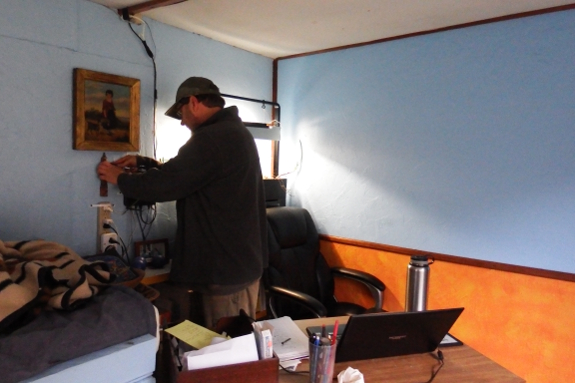
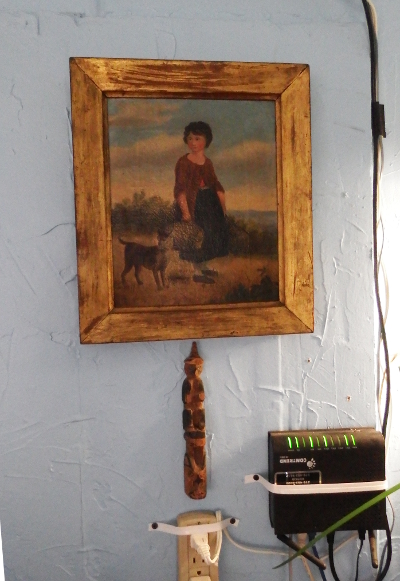 I'd been resisting putting
anything on my newly painted walls. But the edge of the office ended up
turning a little wire-filled, between a router and a charging station
for all and sundry.
I'd been resisting putting
anything on my newly painted walls. But the edge of the office ended up
turning a little wire-filled, between a router and a charging station
for all and sundry.
Mark had the bright idea
of hanging up two small family heirlooms to draw the eye away from the
electronics, and I think he was right. One ancient painting of girl
plus dog/goat plus one hundred-year-old Alaskan totem pole now make a
transition between our aquaponics station and the room at large.
Everything else, though, will remain bare (for now!).
We got some seed in our straw
again....arghhh!
It seems to have attracted
rodents which prompted some aggressive digging on Lucy's part which then
needs to get fixed before the cold weather sets in.
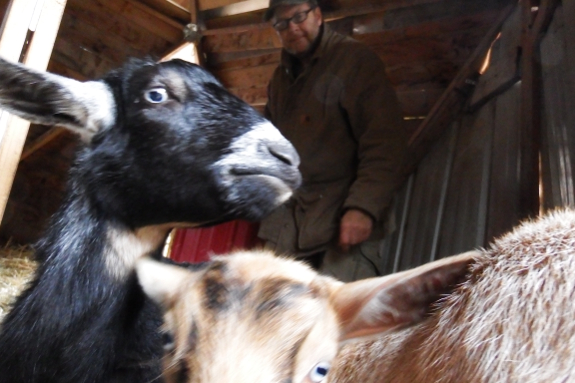
Artie's sick and it's my
own fault. Here's hoping Mark's TLC will fix what I broke.
What did I do wrong?
When I was under the weather this fall, I didn't pay enough attention
to Artemesia's fat levels. She was losing weight, but I figured if I
stopped milking her the decline would turn into an incline.
Unfortunately, Aurora kept nursing on the sly and her mother got
thinner and thinner.
By the time Artemesia
finally weaned her daughter, it was the end of November and she'd been
bred --- more hungry children sipping away at her fat stores. I tried
to counteract the depletions by increasing her
concentrates...but
I'm now realizing that actually knocked her gut bacteria out of whack
and ruined their ability to create that all-important goat vitamin:
thiamine.
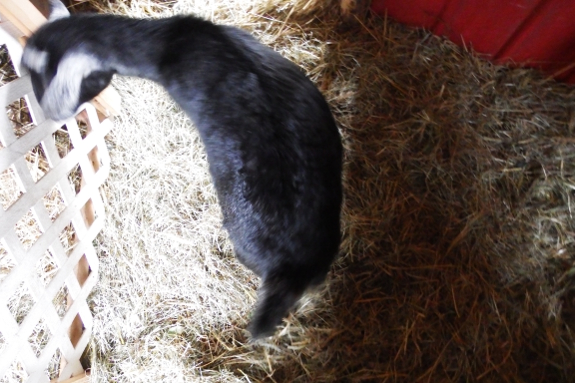
To cut a long story
short, Artie started circling this past weekend, which doesn't sound
like a big deal. But it's kinda scary when your goat isn't able to
stand still long enough to eat and instead spins endlessly, pivotting
around one hind foot so relentlessly that she builds up a
three-foot-long trail of twisted straw. (For future reference, laying
down hay instead of stray at least prevents the buildup since the
shorter particles don't turn into the same sort of rope.)

Monday we were flooded
in and unable to do anything about it. But Tuesday I sent Mark to the
vet to get thiamine and penicillin (the latter is to treat the related
listeriosis, which is an unlikely counter-diagnosis, but possible).
Then my long-suffering husband got to learn to jab needles through
tough goat hide...two needles four times a day until she's healed.
A day and a half in,
we're seeing heartening signs of progress, but still plenty of
spinning. I'll keep you posted as Artemesia (hopefully) rebounds back
to her usual cheerful self.
Artemesia is feeling a lot
better today.
The circling has decreased
and her appetite is improving.
I'm slowly getting better at
giving her shots.
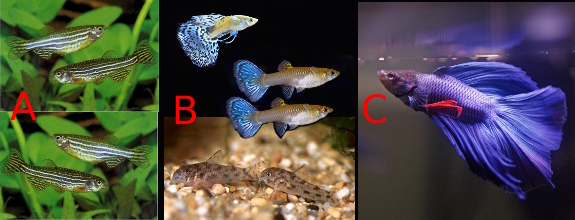
Sure enough, our reader
was right. Our aquaponics setup didn't need more plants --- it just
needed a little more time. Six days after my previous test, I tested
again...and found ammonia, nitrite, and nitrate levels were all close
to 0. Success! Time to choose some fish.
I've narrowed it down to
three unlikely-to-fail options. Perhaps those of you with more aquarium
experience can chime in?
Option A: 4 Danios. I
understand this might be pushing the limits of my ten-gallon aquarium,
but I might get away with it if I choose short-finned varieties that
are less likely to be picked on. Danios are reported to be fast
swimmers who enjoy dancing around the upper limits of the tank.
Option B: Three guppies
(two females and a male) and three dwarf cory catfish. This would be a
busy tank since the guppies would breed (and then eat their babies)
while the catfish would play around near the bottom. Downside --- I
might need to change out my existing gravel bottom for sand for the
sake of the catfishs' tender mouths. And will I fall into the trap of
trying to give all those baby fish away?
Option C: A single betta
for peak beauty (although lower activity levels). Possible problem ---
the beta's beautiful fins and tail might get caught in the intake of
the pump since the species isn't good at handling rapidly moving water.
What do you think?
I took this picture a couple
weeks ago after a flood.
The water level goes up to
about half the tire height of the Kubota X900.
It could handle a little
deeper but that's our comfortable limit.
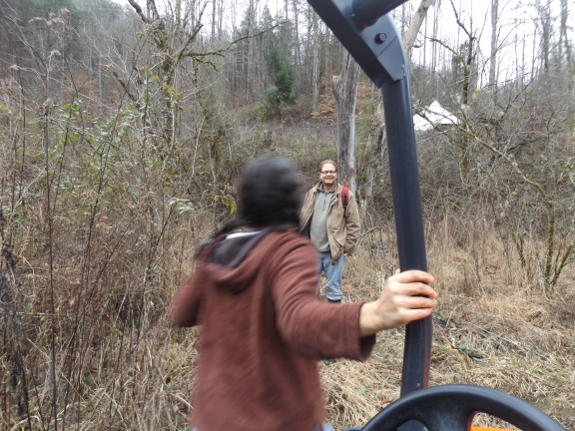
Coming home is one of my
favorite parts of our farm. Whether it's Mark returning from town
(caught by Mom in this photo as I drove her back out to her car) or me
returning from the wide world and soaking up the richness of our
environment, there's nothing quite so wonderful as diving back into the
beauty and tranquility of our trailerstead. Winter gray or summer
green, Lucy and farm both welcome us with wagging tail. Perfection!
I've learned my leason about
using felling wedges for firewood splitting.
It worked good in the
beginning....until the plastic came up against heavy knots.
We ordered the above steel
wedge. Stay tuned for a full report.
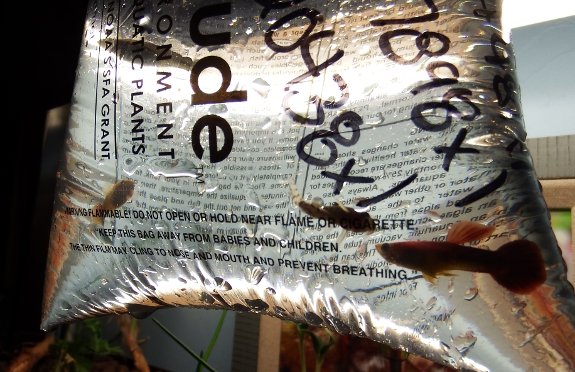
After
deciding my aquaponics system was (hopefully) fully cycled and
ready to deal with fish poop, Kayla and I went to pick out our new
livestock. I opted for one male and two female guppies, plus a tiny
cory catfish. The catfish is actually my favorite --- it doesn't have
pretty colors, but it swims here, there, and everywhere and keeps me
amused.
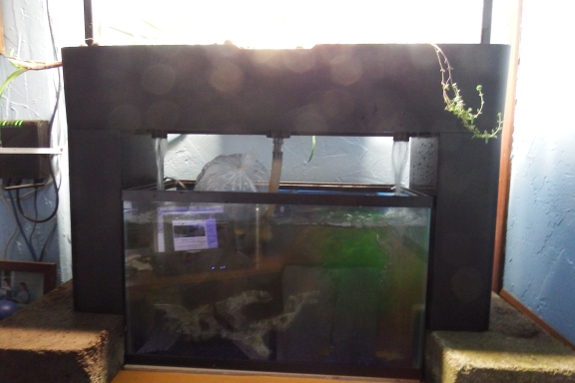
It was a little tricky
to float my pet-store bag in the fish tank since the grow bed usually
sits about half an inch above the top of the aquarium. I had to get
Mark to lift the grow bed while I slid cinderblocks under the legs to
give me room to play in there while introducing the fish to their new
home. After removing the bag, we returned the grow bed to its usual
elevation.
Fingers crossed the
entire school survives life in a new tank. Anyone want baby guppies in
about a month?
We started on the 2017 garden this week by adding some buckets of horse manure.
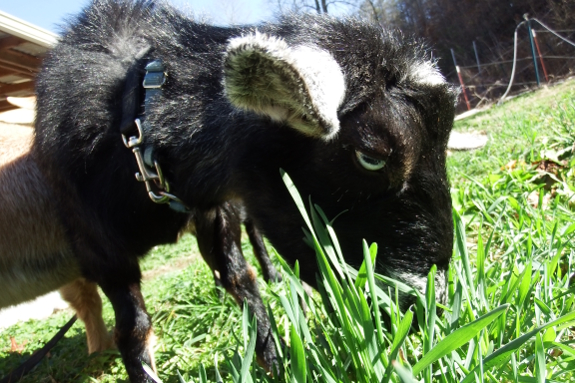
Artemesia was finally
feeling well enough Saturday to come out and graze. What a relief!
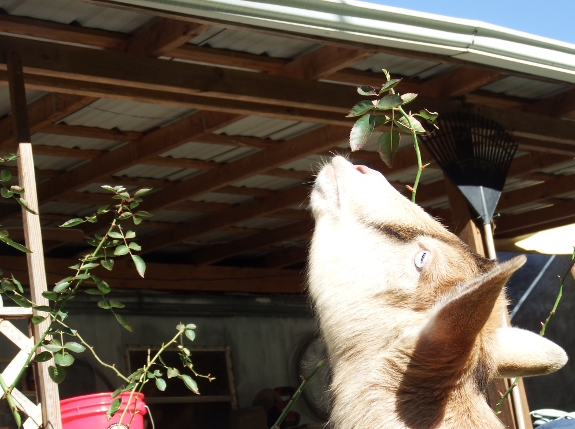
Aurora says, "It's about
darn time! Let's see if I can catch up on a week's worth of trouble in
an hour."
We got enough snow last night
to make the extra long quick hoop sag.
Taking off the pressure helps
to extend the life of the fabric and give the kale a little extra
sunshine.

In late January, two and
a quarter inches of snow melts awfully fast. Even with temperatures
hovering in the mid thirties, the sun is bright enough to uncover
daffodil buds by lunchtime. When do you think they'll open up?
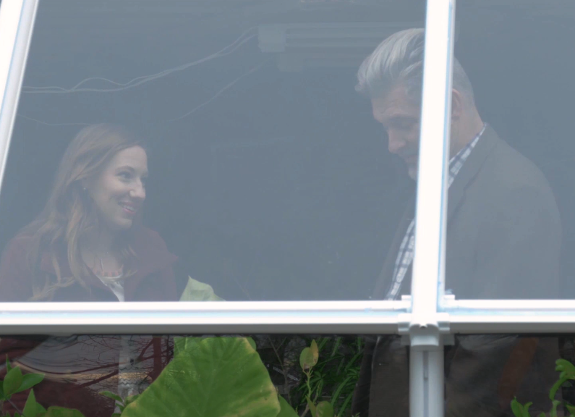
I finally put the finishing
touches on a short film I made for Directing class.
It was great working with all
the people involved and learning the process of film making.
We shot it on a Lumix DSLR at
4k and recorded sound with a Zoom H4N.
Bittersweet Lemons
is a short film about how
caring for a sick lemon tree helped to heal a broken relationship.
Want more in-depth information? Browse through our books.
Or explore more posts by date or by subject.
About us: Anna Hess and Mark Hamilton spent over a decade living self-sufficiently in the mountains of Virginia before moving north to start over from scratch in the foothills of Ohio. They've experimented with permaculture, no-till gardening, trailersteading, home-based microbusinesses and much more, writing about their adventures in both blogs and books.
